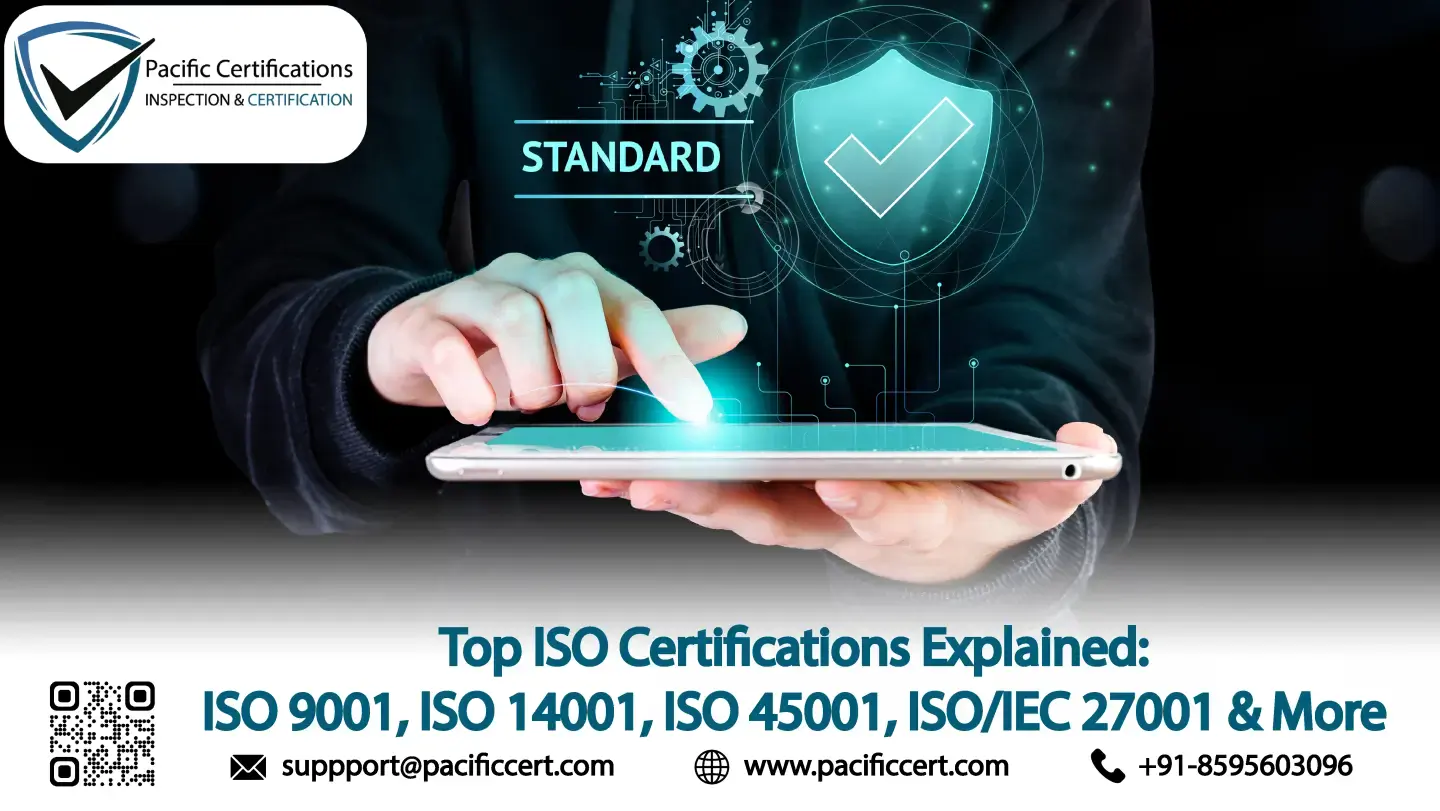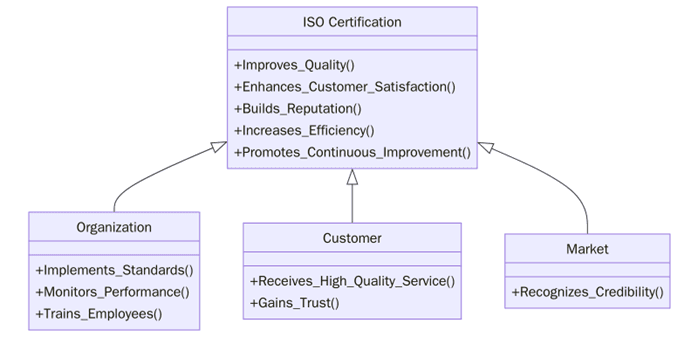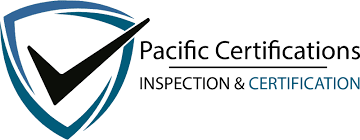Top ISO Certifications Explained: ISO 9001, ISO 14001, ISO 45001, ISO/IEC 27001

Introduction
ISO certifications have grown into much more than simple quality stamps, they show that a company takes its processes, safety, data security, and environmental impact seriously. No matter what field you’re in, whether that’s manufacturing, tech, healthcare, or services, these standards create a shared language of reliability recognized worldwide. By Implementing ISO standards, organizations not only make their operations stronger, but also build trust with customers, open up new business opportunities, and set themselves up for lasting success.
Schedule a certification readiness call with Pacific Certifications and find which ISO standards best fit your organization’s goals.
Quick summary
ISO certifications are international benchmarks developed by the International Organization for Standardization. They standardize practices across quality management, environmental protection, occupational health and safety and information security. The most recognized standards include ISO 9001 (Quality Management), ISO 14001 (Environmental Management), ISO 45001 (Occupational Health and Safety) and ISO/IEC 27001 (Information Security Management). These certifications are applicable to organizations of all sizes and industries, improving both compliance and credibility.
Why ISO certifications matter for modern organizations?
For organizations operating in an increasingly regulated and competitive world, ISO certifications are more than compliance - they are proof of consistency, accountability and trust. Global markets, investors and customers now demand evidence that companies follow reliable systems to manage quality, environment, safety and security. These standards ensure every process is controlled, monitored and continuously improved.
When a company gets ISO certified, it’s not just about recognition. It means fewer mistakes, less waste, stronger supply chain results, and more stability during audits or periods of uncertainty. Customers see certification as a signal that they can rely on the business, while employees benefit from clear expectations, measurable targets, and a stronger sense of responsibility throughout the organization.
“ISO certifications translate best practices into measurable, repeatable systems that build long-term business trust.”
Key ISO standards and what they mean
Standard | Focus Area | Purpose | Who Needs It |
ISO 9001 | Quality Management | Standardizes process control, customer satisfaction and continual improvement | All industries |
ISO 14001 | Environmental Management | Focuses on reducing waste, emissions and environmental impact | Manufacturing, construction and energy sectors |
ISO 45001 | Occupational Health and Safety | Reduces workplace incidents and promotes employee well-being | All workplaces, especially industrial sectors |
ISO/IEC 27001 | Information Security | Protects data through structured risk assessment and security controls | IT, finance, healthcare and data-driven companies |
ISO 22301 | Business Continuity | Ensures business stability during disruptions | Financial, IT, logistics and critical services |
ISO 50001 | Energy Management | Promotes energy efficiency and cost reduction | Manufacturing, transport and infrastructure industries |
ISO 22000 | Food Safety Management | Addresses food safety from production to delivery | Food processing, packaging and catering sectors |
What are the common requirements of ISO certifications?
Achieving ISO certification requires an organization to design, implement and maintain a system that follows structured policies, risk management and measurable performance. Certification readiness involves leadership commitment, documentation and internal evaluation. Below are the key requirements:

- Define the scope of operations and relevant standards.
- Establish policies and objectives aligned with the chosen ISO standard.
- Conduct risk assessments to identify potential weaknesses.
- Document operational procedures, performance metrics and training records.
- Ensure employee competence and engagement in the management system.
- Perform internal audits to identify nonconformities.
- Take corrective actions and record improvements.
- Undergo management reviews to evaluate system performance.
- Engage an accredited certification body for external audits.
Tip:Before certification, conduct a gap analysis to understand how existing processes align with ISO requirements. This will help avoid delays and additional costs during Stage-1 and Stage-2 audits.
What are the benefits of ISO certifications?
ISO certification brings credibility, discipline and measurable improvement across all operations. Organizations that invest in certification see tangible results in productivity, compliance and market growth. Below are the key benefits:

- Improved process reliability through documented procedures and controlled workflows.
- Higher customer satisfaction by ensuring consistent product and service quality.
- Enhanced environmental responsibility, reducing waste and energy consumption.
- Stronger data protection under frameworks like ISO/IEC 27001, minimizing cyber risks.
- Better workplace safety with ISO 45001, reducing accidents and absenteeism.
- Increased competitiveness in global markets through recognized standards.
- Stronger supplier confidence and easier entry into regulated sectors.
- Reduced costs through better efficiency, fewer incidents and less waste.
- Faster tender qualification, as most public and international bids now require ISO certification.
- Sustainable reputation, building trust among customers, regulators and investors.
Schedule a certification readiness call with Pacific Certifications and find which ISO standards best fit your organization’s goals.
Recent Trends
In recent years, ISO certifications are increasingly used to meet environmental, social and governance (ESG) expectations. Industries are integrating multiple standards under a single management framework, known as integrated management systems (IMS). ISO 27001 certifications have surged across healthcare and fintech sectors due to global data protection mandates, while ISO 50001 adoption has expanded in energy-intensive industries focused on carbon reduction and sustainability reporting.
Recent data shows that organizations adopting ISO standards achieve a 20–30% reduction in process-related costs, a 40% improvement in customer satisfaction scores and up to 50% lower incident rates in workplace safety. These numbers demonstrate that ISO certification drives measurable financial and operational results. By 2030, ISO certifications will play a central role in global supply chain management and ESG transparency. Standards like ISO 14001 and ISO 50001 will be critical to achieving sustainability targets, while ISO/IEC 27001 and ISO 42001 will shape digital governance and AI ethics frameworks. Organizations with certified management systems will have stronger resilience, credibility and competitive positioning in international markets.
How Pacific Certifications can help?
Pacific Certifications provides accredited ISO certification services for organizations across sectors. Our audits help companies strengthen governance, improve system reliability and achieve global recognition through impartial and transparent certification processes.
Request your ISO audit plan and fee estimate. We will help you map Stage-1/Stage-2 timelines and evidence requirements for your organization. Contact us at [email protected] or visit www.pacificcert.com.
Training and courses
Pacific Certifications provides accredited training programs for key ISO standards such as ISO 9001, ISO 14001, ISO 45001, and ISO/IEC 27001, designed to help professionals and organizations strengthen their management system knowledge and audit capabilities:
· Lead Auditor Training: Ideal for professionals responsible for conducting internal or external audits of quality, environmental, occupational health and safety, or information security management systems.
· Lead Implementer Training: Intended for individuals tasked with developing, implementing, or improving ISO management systems.
Contact [email protected] to schedule your ISO training program and build expertise in quality, safety, environmental, or information security management systems.
Ready to get ISO certified?
Contact Pacific Certifications to begin your certification journey today!
Author: Alina Ansari
Suggested Certifications –
Read more: Pacific Blogs

